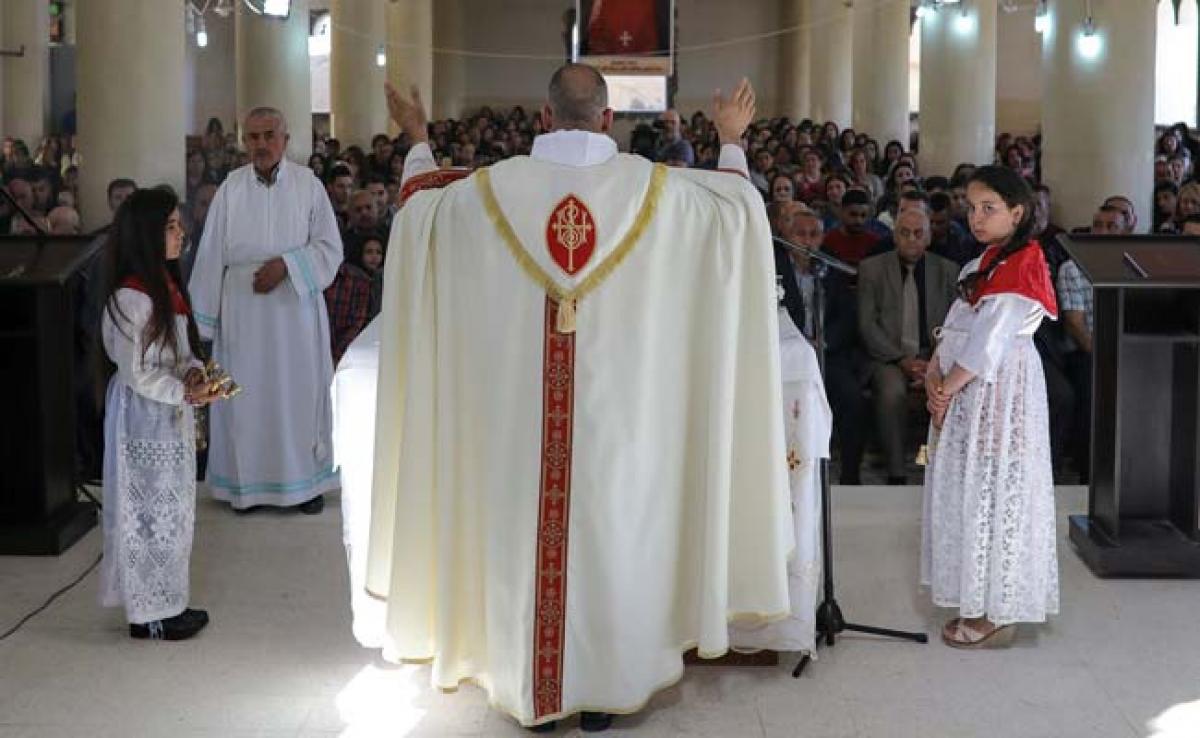Live
- S. Korea confirms 2 more bird flu outbreaks, raising season's total to 23
- SpinSci Health Tech India Pvt Ltd Announces Groundbreaking News: 1,000 New AI Jobs in Telangana
- Devotees flock to temples in Nagar Kurnool district on Vaikunta Ekadashi
- Bimal Das Gupta's introduction of acrylics to India
- Written Test for Establishment of MeeSeva Center.
- Block-Level Sports Meet Organized in Nagarkurnool
- Friendly Legal Services for Child Protection
- If You Lose Your Phone, Lodge a Complaint Immediately - SP Gaikwad.
- TikTok Star Fun Bucket Bhargav Sentenced to 20 Years for Sexual Assault
- CM Revanth Reddy Directs Measures to Resolve Tribal Issues in Telangana
Just In

Hundreds of Iraqi Christians gathered on Sunday in a church damaged by ISIS north of Mosul, celebrating Easter there for the first time since 2014.
Hundreds of Iraqi Christians gathered on Sunday in a church damaged by ISIS north of Mosul, celebrating Easter there for the first time since 2014.
"God willing, the celebration of the resurrection of Christ will also mark the return and rising-up of the Christians in Iraq," said Kyriacos Isho, 75, who was accompanied by his 12 children and grandchildren at Mar Gewargis (St George) Chaldean Catholic church in Tel Esqof.
Tel Esqof, or Bishop's Hill in Arabic, did not sustain the same amount of damage as other Christian towns overrun by the terrorists three years ago in the plain of Nineveh.
Kurds dislodged the hardline Sunni terrorists from Tel Esqof just a week after it had fallen, in August 2014. On Sunday, they stood guard around the church.
The terrorists had smashed the church's windows, though a new cross has now been put up in place of the one the terrorists took down.
A fresh breeze on Sunday cooled the white chapel as the choir sang hymns in Chaldean, a language close to the Amaraic spoken by Jesus.
The mass ended with a festive distribution of soft drinks and coloured eggs in the inner courtyard by a French group, SOS Chretiens d'Orient.
ISIS targeted all non-Sunni Muslims living under its rule, and inflicted harsh punishment on Sunnis who refused to abide by its extreme interpretation of religion.
The region's Christians were given an ultimatum, pay a tax, convert to Islam, or die by the sword. Most of them fled to the autonomous Kurdish region, across the Zab river to the east.
Not Really Home
More than 350 families returned to Tel Esqof which has been more secure since October, when US-backed Kurdish and Iraqi forces launched an offensive to dislodge the terrorists from Mosul, taking back dozens of villages and towns along the way.
For many, though, Tel Esqof is not really home, but simply a place where they feel safe in the company of relatives or friends.
Madeleine Roufael, a 70 year-old widow, is still waiting to return to Mosul, about 20 km (12 miles) to the south.
"Thank God," she repeats, grateful to be celebrating Easter once again. "God willing, we will return home."
Six months into the Mosul offensive, the front line in the battle has moved well into the city, with ISIS terrorists surrounded in a few districts on the western side of the Tigris river.
The terrorists there are dug in among civilians.
Several hundred thousand people are estimated to remain in areas of the city that are still under terrorist control, complicating the battle plans of the Iraqi army and the US-led coalition providing air and ground support.
It was from a Mosul mosque three years ago that ISIS leader Abu Bakr al-Baghdadi declared a 'caliphate' also spanning a part of Syria.
"I wish peace for Iraq, for Syria, for Lebanon," said Aws Hermez, the church's deacon, referring to countries with substantial Christian communities.
"Peace for the whole world."

© 2025 Hyderabad Media House Limited/The Hans India. All rights reserved. Powered by hocalwire.com







